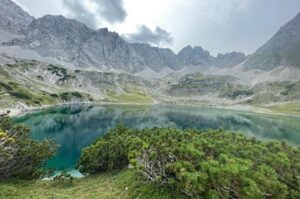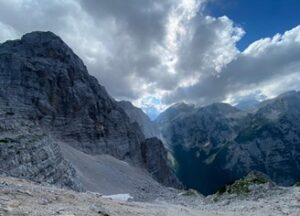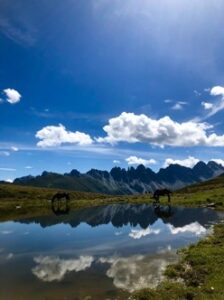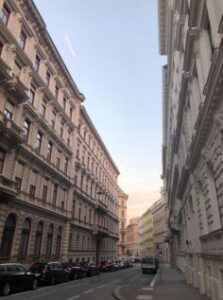Kategorie: ‘Austria’
My Internship at an Architectural Office in Vienna
- Architecture M. Sc.
- Austria, Vienna
- Jadric Architektur ZT GmbH
- 09/2024 – 11/2024
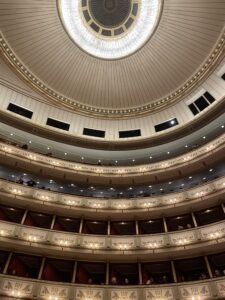
© Selina Maria Pick
My Erasmus+ internship in Vienna was an unforgettable experience that gave me both professional growth and cultural enrichment. From the very beginning, it was a journey filled with excitement, opportunities and memorable moments.
Finding the internship was relatively straightforward. I applied online to a small architecture firm with five employees and was lucky to receive a direct offer after an online interview. The team was incredibly welcoming and the atmosphere at work was open and familiar. We always took breaks together, which helped me integrate into the group quickly and feel like a valued member of the team. Since the team was international, we spoke exclusively English at work. This not only created a collaborative and inclusive environment but also allowed me to enhance my professional English skills, especially in areas like technical terminology and day-to-day communication.
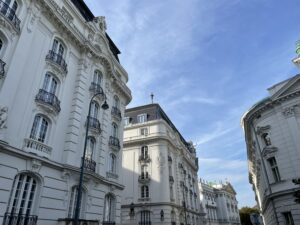
© Selina Maria Pick
To find an accommodation in Vienna, however, was more challenging. I searched for a room to sublet via WG-Gesucht.de and found the housing market to be quite competitive, but with persistence and a bit of luck, I managed to find a room in a shared apartment. It was a beautiful old-style building in a central location, which made exploring the city easy and enjoyable. Living with three roommates added to the experience, as we often shared meals and made trips through the city. While rents in Vienna are relatively affordable, everyday living costs were slightly higher than in Germany, though prices in bars for example were similar or even slightly lower.
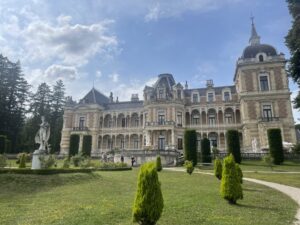
© Selina Maria Pick
My everyday life revolved around the internship and exploring the city. At work, I had the opportunity to engage with a variety of tasks and learn from experienced professionals. The close-knit team created a supportive environment that allowed me to grow both creatively and technically. Outside of work, Vienna offered a wealth of cultural activities and countless opportunities for exploration. From visiting museums and historical landmarks to discovering cozy bars and cafes, there was always something to do. One common stereotype about Viennese people is that they can be at times rather unfriendly, but my experience was the opposite. I found people to be open and approachable, especially once you started a conversation. This friendliness made navigating a new city much easier and helped me feel at home.
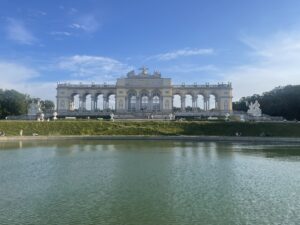
© Selina Maria Pick
For anyone considering an internship in Vienna, I recommend making the most of the city’s rich cultural scene. Don’t miss out on the chance to visit exhibitions and historical buildings, enjoy traditional Viennese coffee houses and relax in the many green spaces the city has to offer. Vienna is also well-connected, making it easy to take weekend trips to other parts of Austria or nearby countries.
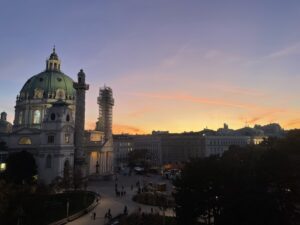
© Selina Maria Pick
In conclusion, my internship in Vienna was an enriching experience that I would recommend to anyone considering doing an internship abroad. The combination of professional development, cultural exposure, and personal growth made it a truly unique opportunity. If you embrace the challenges and immerse yourself in everything the city has to offer, Vienna will leave a lasting impression on you.
Writing a master thesis at KTM Forschungs & Entwicklungs GmbH in Austria
- Automotive Engineering and Transport M.Sc.
- Austria, Salzburg
- KTM Forschungs & Entwicklungs GmbH
- 04/2023 – 09/2023
During this summer semester I did an internship at KTM in Mattighofen, Austria to work on my master thesis. It was a great experience and I totally recommend both, Austria and the company KTM, for an internship abroad.
Application process
In November 2023, I started looking for job postings for a master thesis for the summer semester 2023. I did not particularly look for advertisements abroad, but it was always an option to write my master thesis abroad. Writing your master thesis in a company is an excellent way to recommend yourself for a future employment. At the time of my application, KTM did not offer any master thesis in the relevant fields in their job portal. So, I decided to write a speculative application. I can recommend everyone to do the same if you are interested in a specific company. Often, the departments already have ideas for topics for a thesis, but these have not yet been published as a job advertisement. A few days after my application, I was contacted by the HR department to make an appointment for an interview. At this appointment, the company presented several topics that would have been possible for the master’s thesis. The application process was clearly structured and the HR department always kept me updated.
After finding a company for the master thesis, you need to find a supervisor at university. This can be very challenging. I could not accept an offer from another company be
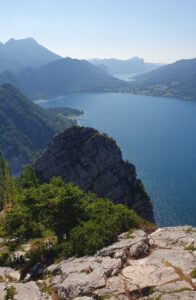
View on Attersee and Mondsee from Großer Schoberstein
© Lukas Rehermann
cause I could not find a supervisor at the university in a reasonable amount of time. In general, I would advise you to ask multiple institutes for supervision at the same time. Even tough I study automotive engineering, my master thesis was not supervised by one of the institutes, which are directly related to automotive engineering, but by a more general mechanical engineering institute. For most institutes, you can see their detailed research fields on their website. The fastest way is to contact the research assistants of the relevant research field directly.
For the Erasmus scholarship application, you need a learning agreement. When I had to submit the application, my learning agreement was not signed by the faculty yet. I could hand in the learning agreement afterwards. In general, applying for the Erasmus internship grant requires less effort than applying for an Erasmus semester at a university. This is mostly related to the recognition process at your faculty.
Accommodation and Living Expenses
After the acceptance by the company, it was time for me to start looking for accommodation. Since Mattighofen is a relatively small town, I looked for shared apartments in Salzburg. The commute from Salzburg to Mattighofen takes about 45 minutes by car or one hour by train. In general, the accommodation search in Salzburg was rather difficult. Especially the fact that I was looking for a room for half a year led to one or the other rejection. I only found a room in a shared apartment a few days before starting work, even though I started looking for a room almost 3 months in advance.
In general, living expenses in Austria are a bit higher than in Germany. Buying groceries and eating in restaurants is more expensive. If you have a car, you can drive to Freilassing in Germany to buy cheaper groceries there. For my room in a shared flat I paid 500 € per month including utilities.
The salaries in Austria for interns are usually higher than in Germany, especially if you already have a bachelor’s degree. Then, the company has to pay you a minimum salary defined in the relevant Kollektivvertrag (collective labor agreement).
Everyday life/the internship
I worked in the vehicle dynamics team at KTM. Of course, most of the time I worked on the research topics of my master thesis. In addition, my colleagues and my supervisor showed me their work, so that I can get a broader overview what the vehicle dynamics team is doing overall. For example, I could sometimes join them on the test track. I felt very comfortable in the team. If I had any questions, everyone took time to help me.
In addition, I was very satisfied with the supervision by university. When writing an external master thesis, it is your job as a student to reconcile the requirements of university and the company. This was eased by the approaches of my supervisors. We agreed that the company was responsible for the research scope requirements and that the university was in lead for the requirements about the documentation. Nevertheless, the university’s supervisor contributed many helpful ideas and provided approaches to solve problems during the research.
Some words about the working conditions: my full-time contract included 38,5 hours per week. I had flexible work time with core times and could take days off using overtime (maximum one day per week). You can work from home maximum 2 days per week. Of course, this also depends on your tasks. In Austria, you usually have 5 weeks of holidays per year. KTM offers many additional benefits for their employees.
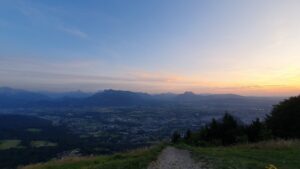
View on the city of Salzburg from Gaisberg
© Lukas Rehermann
Free time/tips
Austria in general is a great destination for an Erasmus semester or internship if you are into outdoor activities. The landscape in the area around Salzburg is amazing! Almost every weekend I went hiking, mountain biking, or similar. I would definitely recommend doing some hikes in Salzkammergut and combine this with swimming in one of the lakes afterwards.
Salzburg is a beautiful city with an amazing old town. There is always something to explore. In addition, many students live in Salzburg. If you try to connect with other people outside work, contact the ESN Salzburg even though you are not an Erasmus student at University of Salzburg. They organize many events, and you can try to connect with other Erasmus students via their WhatsApp group chat.
Conclusion
All in all, I am super happy with my decision to write the master thesis in Austria. I enjoyed the stay there and made many new friendships. I would recommend this to everyone who is interested in going abroad. In the end, I continue working at KTM after finishing my master’s degree.
It is to mention, that an Erasmus internship is a completely different experience than studying at university abroad. Before going to Austria, I already did two Erasmus semesters at universities. When studying, you are way more flexible in planning your free time, for example for travelling. But of course, this does not mean that you do not have any free time during an internship. Especially if you have flexible work time, you can find enough opportunities to extend your weekends for travelling and exploring the country.
Practical year in Innsbruck
- Medicine
- Austria, Innsbruck
- University Hospital Innsbruck
- 07/2023 – 09/2023
- application
I sent an application with a letter of motivation, curriculum vitae and certificate of matriculation to Monika Schlager about 1 ½ years in advance. She is the international coordinator of the medical faculty and responsible for Erasmus students.
Ms. Schlager answers very reliably and quickly and sent me an internship confirmation within a few days. The places in Innsbruck are very popular, which is why it is worth applying early.
© Jana Mattes
Only whole months can be done in Innsbruck, so it is only possible to start on the 01st of the month. The wards Oncology and Gastroenterology were assigned to me by Mrs. Schlager, but if you have desired wards, you can certainly indicate that.
2 Accomodation/ Living
Austria and especially Innsbruck are a bit more expensive compared to Germany.
I started looking for accommodation about two months before the start of my internship. I mainly looked through the site WG-gesucht and found there a two person shared appartement in close proximity to the main train station as well as 5 minutes by bike to the clinic.
The rent was quite expensive at 630 euros for a shared apartment.
Overall, it is quite difficult to find an apartment/room in Innsbruck. In the summer months from July-September it is a bit easier, because the students have semester break and many sublet their apartments. In November/December or in March it is a bit more difficult to find something.
Food prices in Innsbruck are also about 20-30% more expensive than in Germany.
You get free lunch in the hospital, but you only get the Erasmus money and don’t get a salary anymore.
© Jana Mattes
3. the internship
I liked the internship in internal medicine very much. In Innsbruck, unlike in Germany, there is not such a great shortage of doctors. On the oncology ward, we were partly three doctors and I for a total of 8 patient rooms.
The working hours are also much better than in German university hospitals. It is rare that the interns have to work overtime.
The relaxed atmosphere made the internship very pleasant for me. There was always a doctor who had time to show or explain something to me.
My main duties were admitting and educating patients, writing discharge letters, some blood draws (when nurses couldn’t do it) and pulling CVCs and drains as well as helping to supervise famulants. When there was time, I could always grab the ultrasound machine and practice on patients. My working day usually lasted from 8 am – 4 pm, but if there was little to do, I was often sent home around noon.
The head physician and the senior physicians of the ward are also very friendly and like to explain or do a little teaching during rounds. I was there for a total of two months.
The last month I was in gastroenterology. Here the doctors were also very well staffed and my tasks were similar to those in oncology. Overall, however, I liked the ward work a little less, as hardly anything was explained and there was little teaching.
Unfortunately, it was not possible/desired to look after patients myself from the beginning to the end of treatment.
What I found very positive was that, unlike in Germany, less attention was paid to the money and the patients were very well cared for and treated.
Overall, I can still highly recommend an internship in Innsbruck. The doctors are all very nice and always have an open ear for questions. You can work independently but also leave earlier if there is little to do. It is also possible to accompany doctors on duty in the emergency room, where you can learn and see a lot.
© Jana Mattes
4. free time
Innsbruck is a paradise for those who love climbing/hiking/mountain biking or road biking. In winter it is of course also a dream for skiing/snowboarding.
During the week I was often in the climbing/bouldering hall, where you often saw world famous climbers.
On the weekends I went hiking and climbing in the surrounding area. Unfortunately, I met few other Erasmus students. However, through various Facebook groups, it is easy to make friends with other people who are new to the city and thus find connections quite quickly. The mountains around Innsbruck are beautiful and you can go there easily by bus/ train.
- conclusion
Overall, I can recommend an internship or a tertial in Innbruck to anyone who wants to get a good teaching and something out of the internship, but who also knows how to value his free time and especially likes outdoor activities.
I found the comparison to Germany, where doctors in university hospitals often work 4-5 overtime hours a day and the treatment of patients is much more focused on money, very impressive.
Wonderful time in Vienna
- Medicine
- Austria, Vienna
- Universität Wien
- 03/2023 – 07/2023
1. Application/Internship search
My journey began 2 years ago, when I considered doing a tertial of my practical year abroad. I had already done an internship in gynaecology in Vorarlberg and really liked the system and the friendliness. Vienna was also not completely unknown to me from visits and so I decided to go to Vienna. Also, because it was a perfect fit with German as the national language and the hospital system is of a similar standard to Germany. So, I was able to find my way around quickly in my first few weeks and had no problems with a language barrier.
Now, it should be noted that you should plan early if you decide to go to Vienna. Places are in high demand and, with around 600 students a year from MedUni alo
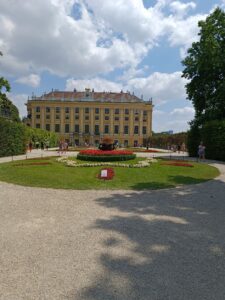
Schönbrunn Palace
© Lea Victoria Eckstein
ne, they are quickly filled. So, I started looking for a suitable hospital with the help of an online website and the PJ list of my state examination office. Ideally, it should already be recognised and a teaching hospital of the University of Vienna. That’s how I found the Franziskusspital Margareten, the former Hartmannspital. Maybe not outstanding in terms of size, but with its very own charm. I applied for a place in surgery, as this was one of the compulsory tertials in our PJ and relatively easy to complete abroad. I received positive feedback and was really looking forward to my time in Vienna.
The waiting time seemed long. Especially because the last information and documents were only sent shortly before the start. Not to mention that there were still problems with the recognition, because the “Landesprüfungsamt” requires a separate document for foreign tertials, which the University of Vienna does not sign. Instead, they issued a different document, which fortunately was recognised after a few exchanges of emails from the university PJ coordinators. Now, hopefully, nothing stood in the way of my stay, and I thought about suitable accommodation, travel health insurance and my financial situation. Since the practical year is generally not very well paid, I looked for options. I found an online article about the possibility of applying for an Erasmus+ scholarship, which was to be awarded specifically for internships. So, I tried my luck, and it took quite a bit of written arrangements, various emails and 2 application processes, but it was worth it. In January, 2 months before my stay abroad, I received feedback that my internship would be funded by the Erasmus+ programme of my university and that the University of Vienna also accepted my application within this framework and enrolled me as a temporary student.
This meant that I could register as a student in Vienna and received benefits such as the semester ticket, which allowed me to use public transport at very low cost from February to June. I was in contact with the International Office, which was very friendly and helpful. In Vienna itself, I made an appointment to clarify the final formalities. Beforehand, the entire application process and the document transfer took place via an online portal. This was uncomplicated and accompanied me until the end of the internship.
2. Accommodation & cost of living
Now the search for accommodation began, which I started relatively late, as a previously arranged accommodation through friends was not available in the end. In retrospect, this turned out to be fortunate. Just over a month before my trip, I started looking for a suitable room in a shared flat for the limited period. I simply used “wggesucht.de”. At first, it seemed quite difficult. There were a few ads, but only rarely did anyone respond to the request. But I was lucky, and a flat-sharing community contacted me. It was in the 3rd district and my job was in the 5th district. I could walk to work in half an hour or even faster by bus or tram. This seemed perfect and I was happy when I got an acceptance letter. Moreover, the price for the 10m^2 room with bunk bed was only 316€. It must be said that there is a much larger proportion of social housing in Vienna, which the city has subsidised and where the rents have remained cheap. That means you could get a bargain or two. However, the “normal” prices of the shared rooms tended to be much higher, around 500-600€.
On top of my rent, I had to pay my own monthly costs for various insurances, mobile phone tariffs and Spotify, as well as my old-age provision. That added up to quite a lot every month (about 280€).
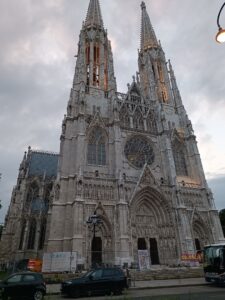
Votiv Church
© Lea Victoria Eckstein
And of course, there’s food, which is already more expensive here in Austria than in Germany. Inflation has made it even more expensive, but it was still a bit of a shock for me when I went shopping at Hofer/Aldi and spent about €50 on a normal weekly shopping trip instead of €25 (before inflation, admittedly). So, I spent about 200-250€ a month on food. All in all, I spent about 900€ a month. Then there were the leisure activities, and especially the months when visitors came, the monthly expenses were already over 1000€. All in all, Vienna is average, I would say, if you can find cheap accommodation. But the leisure activities can increase the expenses quite a bit, depending on how much you want to indulge yourself and how much you can. I also had a loan as a backup that I could fall back on. That’s something everyone must decide for themselves. Even though I would have liked to do without it altogether, I also needed the security to bridge the intermediate phases of the tertials.
3. Everyday life/internship
In March 2023, I started my journey with the DB to Vienna, whereby I planned some lead time for the bureaucratic things. I planned the registration with the city about 2 weeks before the trip and reserved an appointment. The same went for the International Office. That way, I was able to work through everything smoothly during my first few days in Vienna. I received a warm welcome from my shared flat and was able to settle into my room and explore the area very quickly.As my internship, I typically started my workday at 7am with the morning meeting. This meant I had to get up at just before 6 to get ready and get going on time. My way to work took me past Belvedere Palace, through long house canyons and across a playground to my hospital, which is integrated in the middle of a house block. There I was assigned my respective task in the morning. At the beginning, this consisted mainly of assisting in the operating theatre. But since the team was small overall, I was able to be a 1st assistant very often and learned how to sew in my time. I usually worked alone with a senior doctor at the table or also with a 2nd assistant. Otherwise, I worked on the ward and made admissions, went on rounds, helped the residents, and talked to the patients after the operation. On days when I didn’t have a fixed schedule, I was also able to go to endoscopy or special outpatient departments. Despite the small surgery, the spectrum was relatively broad because of the many affiliated doctors who came to the hospital to operate. There were orthopaedic, neurosurgical, and ophthalmic surgeries, for example, in which we worked rather subordinately. But there were also mamma operations and thyroid operations in addition to general surgery. So, I gained a relatively broad insight into surgery. Even though, of course, major operations and trauma
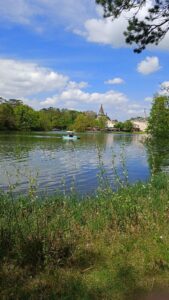
Laxenburg Castle
© Lea Victoria Eckstein
surgery were missing. However, this was made up for by the atmosphere. For me, the official end was at 1 pm plus a half-hour lunch break and 1 hour of self-study. Here in Austria, an hour of self-study is part of the working day for students. However, there were also days when I stayed longer in the operating theatre to help with an operation or to take some pictures on the ward. Afterwards, I went straight to the city or back home.
The team was very nice overall. I was integrated immediately and got my own phone, a locker and someone was always ready to explain things or let me try things out myself. In the operating theatre, the staff were very courteous and the atmosphere during the operations was relaxed to humorous, depending on the day. You could go to all the senior doctors at any time and especially to the head medical secretary in charge, who always had an open ear and with whom you could also talk about wishes for days off or holidays without any problems.
4. Free time/tips
In addition to work, there was also plenty of free time, and sightseeing was not neglected. Vienna is simply a beautiful city. Everywhere you look you see house facades with stucco or ornaments. The city simply has its very own flair. The big buildings like Sissi’s Hofburg, Schönbrunn Palace or St. Stephan’s are the most typical tourist destinations. But through my longer time in Vienna, the beautiful parks also won my attention. When winter gave way to spring, everything started to blossom and for such a big city, Vienna really has a lot of beautiful green spaces and parks all over the place. Even from my flat you had a view of a smaller park from the balcony. However, my personal highlight during my time was the Danube Island. I was particularly taken with it, because it is simply a very long island in the middle of the Danube surrounded by water and yet the big city. A piece of dysentery in the middle of the stress. It can even be reached by underground line U1 and is especially popular at weekends for cyclists, hikers, walkers, families, and students. It offers small restaurants, paved paths, access to the Danube for swimming, volleyball courts and barbecue areas. And of course, there is a lot of meadow and sunbathing areas where, in good weather, the most diverse groups spread out on blankets, but also individuals who just want to enjoy the sun. During my stay, the annual Danube Island Festival also took place where I could hear Felix Jaehn and Silbermond live. Apart from that, Vienna is just incredibly diverse. There is so much gastronomy and especially coffee houses, which are very popular and where you can eat typical Viennese specialities. The famous “Sachertorte” at Café Sacher or an Esterhazy slice at Gerstner’s? I recommend the Sacher cake at the “Hofzuckerbäckerei Demel”. It’s a little more tart and chocolaty to my taste. But everyone has their own taste:)
As for entertainment, there is so much to choose from that I often couldn’t decide what exactly I wanted to see. The many museums, but especially the theatre performances/the ballet/the musicals/the operas really appealed to me. With the Ticket Gretchen app, I was able to register as U27 and benefited from many offers and incredibly cheap tickets. For example, I was able to book a ticket for the Burgtheater and the Volksoper for €10-12 on certain dates in every seating category. I sat in the balcony with a direct view of the stage for a Shakespeare play or in the second row in front of the orchestra pit for a musical. Concerts in St. Stephan’s Basilica or dance evenings could also be attended at low cost.
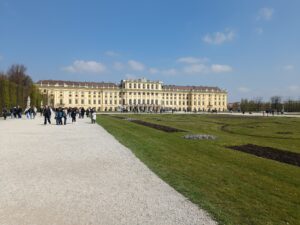
Schönbrunn Palace
© Lea Victoria Eckstein
As soon as I had visitors, I always went either to the State Opera, the Volksoper or to some other event. I wanted to experience most of the cultural offer. And it was worth it and can be recommended for anyone who is U27.
In May, the Vienna Festival Weeks started, with fairs, festivals and wine/beer festivals lined up on the weekends. There was not a weekend without a programme. And in some cases, admission was completely free, and you could just stroll through and enjoy.
5. Conclusion
Overall, I had an incredibly wonderful time in Vienna. And I would do it again every time. Both the work was fun, but also the city won me over. Seeing how summer comes to Vienna, how the parks become greener, how you can explore nature and the hiking trails in the surrounding area and still be able to enjoy the advantages of a big city with all its culinary and cultural offerings was a dream that I was able to fulfil. Thanks to the Erasmus funding, among other things, I was able to enjoy a few things without having to turn over every euro. I am very grateful for that.
Six-month internship in Vienna
- Architecture M.Sc.
- Austria, Vienna

© Amelie Schmitz
- einszueins architektur
- 10/2022 – 04/2023
Preparation:
I applied for an internship at einszueins architektur at the end of September 22 (quite late).
Fortunately, I found a few familiar faces (fellow RWTH students) on the website and therefore had a
little help to get started. A few days later, 1:1 invited me to a very open and cordial online application
meeting. Just 14 days later, I was sitting in the office and had my workplace! Since Vienna has
relatively high living costs, I applied for the ERASMUS + Internship Scholarship, which I can
recommend to everyone. Since I had already been abroad with Erasmus the semester before, I was
well acquainted with the documents and found the application process easy. You can gather your
documents spontaneously at least six weeks before the application. Therefore, it was no longer
possible for me to apply in time, so I could not get the first funding rate. After six weeks, the funding
could begin as planned.
Finding Home:
The search for a flat share in Vienna resembled what I knew from Germany. You can get far with WG-gesucht, but the rush is much higher than in Aachen. The timing of my application was quite bad, so I
had to put up with two interim tenancies (very unproblematic) for the time being. From December
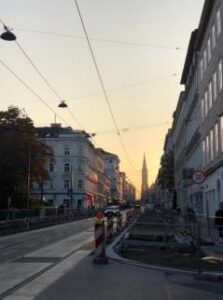
© Amelie Schmitz
onwards, I was able to stay permanently in one place. Vienna is surprisingly cheap (despite being the
capital). You can find all kinds of rooms between 300 and 600 euros. If you are looking for something
affordable, it certainly makes sense not to look in the hottest districts (e.g. 7 and 8). I lived in the 16th
district (Ottakring) and found it very cheap and lively.
Traineeship:
The internship went well, and I am glad to have been at einszueins. Due to the manageable size of 22
employees, I got to know the entire team well and quickly. The bosses attach great importance to a
good group atmosphere, which is why there is an office meeting once a week. Lunch is also freshly
cooked and eaten together in the in-house communal kitchen.
Regarding content, I helped develop a portfolio strategy for Vienna’s first non-profit housing company
and had a lot of responsibility. I was also allowed to help with the competition design for the
Zollhafen in Mainz, which we eventually won. I was understood as an equal team member and rarely
had the typical intern reputation.
Free Time:
The range of leisure activities in Vienna is enormous and varied. Especially art and culture lovers get
their money’s worth. As long as you are under 27 and a student, you can get a reduced rate on many
admission tickets. The Federal Museums Card (59,- for eight different museums) was worthwhile. I
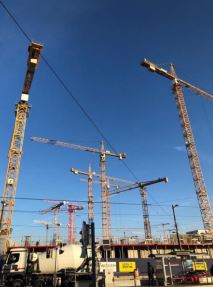
© Amelie Schmitz
attended many theatre and opera performances and various small cinemas with art house films.
Especially in spring, the city wakes up from hibernation, and it’s a lot of fun to explore the area on
foot or by bike. I often went to the Brunnenmarkt on Yppenplatz on Saturdays and enjoyed the sun
there. The Danube Canal is also a little oasis in the city. Everywhere are many authentic cafes and
restaurants where you can pass the time in a tasty way!
Transportation:
Vienna has a reasonably well-developed public transport network consisting of buses, trams, and
underground trains. I opted for the annual pass for 365 euros and canceled it after six months for a
penalty fee of about 20 euros. You get the rest of the money back to travel anywhere for roughly one
euro daily. In addition, I found the offer from the company Eddy Bike excellent. I was able to rent a
high-quality city bike there, which can also be canceled monthly (similar to Swapfiet but local). The
train connections to nearby cities such as Prague, Budapest, or Venice are well-developed and lure
you out of Austria.
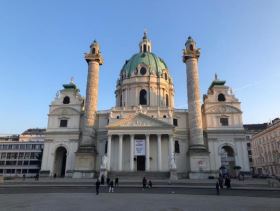
© Amelie Schmitz
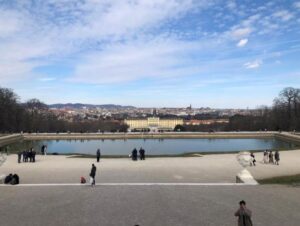
© Amelie Schmitz
Conclusion:
Vienna has proven to be a very liveable city, and I felt very comfortable there. I can imagine spending
more extended time there again or starting my career there. Unfortunately, I didn’t have enough time
to enjoy the nature around Vienna, but I’ve heard it’s also very worthwhile. I highly recommend an
internship in Austria because you have a change of scenery and get to know a different building
culture. Yet, you have hardly any language difficulties and can familiarise yourself with the new
country and working environment. To use the Erasmus+ fund makes much sense to extend the loan
of your internship.
Consulting internship in Vienna
- Electrical Engineering and Business Administration M.Sc.
- Austria, Vienna
- Capgemini Consulting Österreich
- 10/2022 – 02/2023
Motivation and formalities: Before writing my thesis, I wanted to take the chance to get to know another business sector and to experience what it’s like to live in the beautiful city of Vienna. Therefore, I applied for a consulting internship at Capgemini Invent. The application process was very quick and the colleagues I met in the process gave me a very good impression of the work culture and lifestyle in consulting. Since I am not European, I needed a work visa, which is theoretically easy to get if you do an Erasmus internship. Unfortunately, the administrative department of the company had no experience with Erasmus interns, so I had to do a lot of research and contact many institutions.
Preparation: I started preparing four months before the start of my internship, and the time was just enough. In my case, the most difficult part was getting the work permit, but in general I would say that after accepting the internship offer, the only thing you have to prepare is the accommodation. I looked for a shared apartment in WG-Gesuch because I didn’t know many people in Vienna. I was very lucky to find a very friendly, open and helpful flatmate. The apartment was very modern and spacious and was located in the 16th district and very well connected to the office, but also to the city center and only 10-15 minutes away from my favorite cafes and bars in the 7th district. To get there, I took the night train from Aachen to Wien Meidling Bahnhof (and then the subway to the apartment) 10 days before my first day of work, so I could settle in well in Vienna. I can only recommend this, because during this time I was able to enjoy the warm September days, take care of some organizational things, get to know my flatmate better and meet people who are now very good friends of mine.
- Internship Search: I found the internship through LinkedIn and didn’t apply to anyone else because they got back to me very quickly and made a very good first impression.
- Apartment search: Via WG-Gesucht. I would 100% recommend a WG. I have also heard of other search portals like housing anywhere or willhaben. There are also accommodations in the STUWO dorms and many private and very modern student apartments.
- Phone or bank/account opening: Was not needed.
Formalities on site:
- Health insurance: My colleagues and I were automatically insured by ÖGK. For the insurance card, I had to submit a photo and it was delivered to my apartment. I then went to the general practitioner with the card. That worked very well.
- Everyone has to register their address and also deregister when they move out.
Everyday life/leisure: The five months in Vienna were a wonderful experience. Since I arrived at the end of September, I was able to do some wine hikes at Wilhelmina Berg, Kahlenberg and Nussberg. As well as a grills and chillings by the Danube. In the colder months my friends and I spend time in various museums (recommend the long night of museums; Mumok, Albertina, Albertina Modern, Leopold and the Kunsthistorisches Museum), bars (Monami, Café Anno, Prosecco Bar, Liebling), cafes (Ramasuri, Wirr, Ulrich & Erich), exhibitions, small concerts, pop up vintage stores and the Naschmarkt.
I can also recommend a visit to the ballet, the opera, a musical and a Christmas concert. During the Christmas season, there is a Christmas market on almost every corner. My favorite is the one at Spittelberg, but the Christmas market at Spittelberg and the one at Schönbrunn are also worth a visit or two. You also have to keep in mind that during the week I could only go out for dinner or drinks because I worked around 50 hours a week, but on the weekends I could enjoy everything Vienna has to offer. As for sports, my flatmate, some friends and I were members of “myClubs” (like Urban Sports in Germany) and could visit many different studios in the city. Another option is to sign up for university sports classes (USI).
- Going Out: There are many cheap and also fancy bars around Schwedensplatz and also in the 6th, 7th and 8th district. My favorites are the ones mentioned above. For live music, there are many bars on the “Gürtel”. For partying, my favorite clubs are Grelle Forelle (mostly techno) and Volksgarten (eclectic and mostly commercial music), but there are many others (Pratersauna, Praterdom, O Club, VIP, etc.). I’ve been to Vienna in the colder months, but I’ve heard there are lots of raves and outdoor parties in the summer.
- Culture shock: Only positive things! My flatmate was very welcoming and introduced me to her friends. At work, everyone was also very friendly and we did many activities together outside of the office. There were many new young co-workers like me, so it developed into a nice friendship. At a salsa night, I met some Erasmus students with whom we explored the city together and created unforgettable memories. I hope to see them again soon!
Falling in love with Vienna
- Architecture M.Sc.
- Austria, Vienna
- AllesWirdGut Architektur ZT GmbH
- 09/2022 – 02/2023
In September 2022 I started my 6-month long internship at AllesWirdGut Architekten in Vienna, Austria. As Austria’s capital and its largest city Vienna offers a multitude of diverse activities. Its stunning historic architecture and impressive offer of culture and art made the city so appealing to me.
Before I moved to Vienna, I researched different architecture offices in the city. Finding the right office for me was at first a bit overwhelming, as it was my first experience
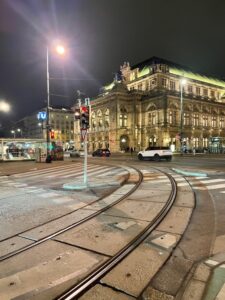
© Pauline Linka
working in an actual office and I wanted to gain insight into various parts of the office life. Furthermore, I wanted to be able to identify with the office’s style. When searching for offices to apply to, I recommend checking out their social media presence. Most offices have an Instagram page, which not only shows their projects but often also gives an insight into the daily work environment and the general atmosphere.
After finding an internship, I started looking for a room to rent on WG-Gesucht. From my friends I know that finding a room can take some time but I found that after investing some time in writing an informative message about yourself and taking part in a few WG-Castings I was able to find a nice room in a great location quite easily. I found a room in the 3rd district, close to the Belvedere and with a great public transport connection to my office. Compared to ot
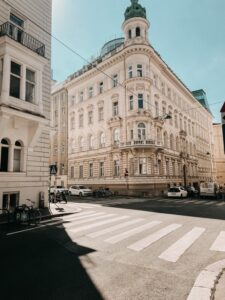
© Pauline Linka
her large cities rent in Vienna is quite low and there are many beautiful his toric apartments available for rent. However, I recommend looking for an apartment with roommates, as single apartments tend to be more expensive and as an added bonus, living in a shared apartment is a great way to make friends when moving to a new city. There are also many possibilities to rent an already furnished room as I did. That definitely made moving much easier. Another important factor when looking for an apartment is the location. In general Vienna’s public transport system is very reliable and well connected, which makes it possible to also move to the outer districts. Nonetheless I would recommend looking for places with in the first 9 districts, they all offer different cultural sights and are very lively and well connected. The 10th district is known to be unsafe and not the most desired living area however over all Vienna is a very safe city and as a woman I never once felt unsafe, even when walking home alone at night.
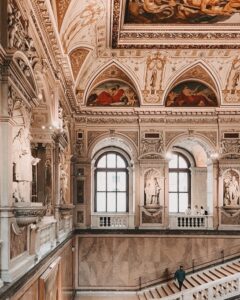
© Pauline Linka
After finding a place to live, there are a few more things that need to be taken care of. The first thing after moving into the new apartment should be a visit to the closest municipal district office to register the new address. My health insurance was covered by my employer and all I had to do was to apply for my Austrian E-Card with my Austrian social security number, however even without an E-Card there are no problems when going to the doctor, they also accepted my German insurance card.
I arrived in Vienna a few to days before my internship started, to get settled and to explore the city. Besides seeing all the major sights, I really enjoyed just walking around and exploring the city away from crowds. Another great way to see Vienna’s sights is taking the tram or Bim as it is called by the locals, the lines 1, 2 and 71 drive by the opera, the city hall, the parliament, the Volksgarten and the Hofburg. While the 1st district is often overcrowded by tourist
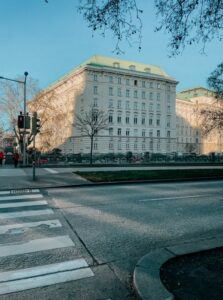
© Pauline Linka
s, checking out the Stephansdom and the Hofburg are mandatory. Besides that there are many famous cafes, bars and restaurants located here. The best Schnitzel is served by Figlmüller, which has three locations in the 1st district. It’s usually booked weeks in advance and a reservation is recommended. In general but especially on the weekend reservations are mandatory to explore Vienna’s diverse cuisine, not only restaurants but also bars, are usually booked fully from Thursday to Sunday. I also recommend trying a piece of Sachertorte or some traditional Kaiserschmarrn at Café Demel, one of the oldest Coffeehouses and bakeries in Vienna. Personally, I prefer the Sachertorte at Café Demel over the one at Café Sacher, but there are entire guides about finding the best Sachertorte in the city. It’s a thing. Also ordering a “coffee” in a Viennese Coffeehouse will get you a concerned look from the waiter and a lecture on coffee, so I recommend ordering a mélange, the viennese version of a cappuccino. However the fact that Vienna besides being voted the most livable city repeatedly is also supposedly the unfriendliest city, cannot be confirmed. Unless you count the waiters in a traditional coffeehouse.
I experienced the people in Vienna as very open and welcoming. I found it was quite easy to make new friends, however I was also very lucky, as there were quite a few interns at the office I worked at, which made it easy to connect with new people.
In general, I had a great experience in Vienna. I really enjoyed working in an architecture office and learned a lot. During the last 6 months a made amazing new friends and fell in love with the city a bit more everyday. Even though I used every free minute after work or on the weekends to see more of the city, there is still so much left to explore. That and the fact that I instantly felt at home in Vienna led to my decision to stay and finish my Master in Architecture at the TU Vienna.
Internship at Bosch in Austria
- Mechanical Engineering B.Sc.
- Austria, Hallein
- Robert Bosch AG
- 10/2022 – 03/2023
After postponing my mandatory internship for as long as I could due to the covid pandemic, as I wanted to do it abroad, I finally decided to do it during the winter semester of 2022. Since it was during winter, and I really like skiing, I decided to search for internships in Austria and Switzerland. This is where things started to get a little complica
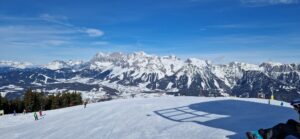
© Ralph Rauhut
ted: The mandatory internship for the Mechanical Engineering B.Sc. degree has to cover very specific topics to be accepted as such. Only few companies have the capacity to offer all the tasks that are needed to acquire the requested experience.
I searched all over the internet for internship openings that met the needed criteria. As there were only few openings, I knew that I had to polish my application documents to even have a chance of getting the internship. I asked help from friends to improve my CV and motivation letter, and gathered letters of recommendation from my previous bosses. After a couple of negative responses, I finally got invited by Bosch in Hallein to two online interviews (for a total of four internship openings). Each interview was held by a manager from the respective area, and someone from HR. The interviews were very relaxed and felt more like a normal conversation with friends, where we talked about my background,
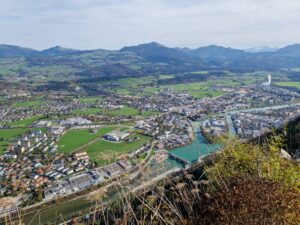
© Ralph Rauhut
my goals for the internship and about the internship they were offering. About a week later I got the best possible response: I was offered all four internships they were offering. After analyzing all the offers, I picked the one that matched my interests and the ones from the university the most. Now it was time to get ready to move to Hallein, a small city around 15km from Salzburg.
Through WG-Gesucht I found a furnished room in a shared flat with two other flatmates in Hallein. It is also possible to live in Salzburg and go by train to work every day, it only takes around 30 minutes from Salzburg to Hallein, but I think I made the right decision of living in Hallein and having a shorter commute time. Despite being a rather small city, Hallein has everything you need to live comfortably: Supermarkets, Gym, Restaurants, etc. The only thing Hallein lacks, is the nightlife. But thanks to the good train connections, going to bars and parties in Salzburg is not a problem. What Hallein lacks in nightlife, it has in nature. Hallein is surrounded by mountains with peaks like the “Barmsteine” and a big river, the Salzach, which crosses the whole city. Close to the city you have a lot of hiking trails into the mountains. In winter you can reach a lot of ski resorts in less than an hour by car. My favorite ski resort was Obertauern: Cheap, good snow and good slopes.
The internship at Bosch couldn’t have been better. Before my arrival they sent me a brochure with all sorts of information, including information about the city, the documents I would need, possible accommodations, how to take vacations and how the check-in system worked. As soon as I arrived at Bosch, I was assigned a tutor who was in cha
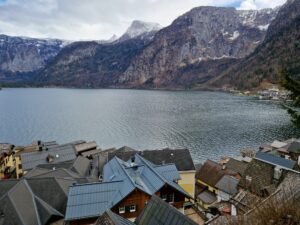
© Ralph Rauhut
rge of explaining to me how everything worked in the company. I had a lot of freedom to choose which projects and with who I wanted to work. Everyone at the company was friendly to me, and I never felt being treated differently for being “just” an intern. I had to assume a lot of responsibility, but I was also awarded the respective recognition. The company also offered a lot of benefits, like discounts on different store
s and cheap meals (3 EUR for a 4 course menu). During my internship I learned a lot and made some important connections that might help me in my future career. There were also many other interns with whom I became friends with and continue to stay in touch after the internship ended.
During the weekends I was always on the go. When I arrived to Austria I purchased the “Klimaticket Ö” which allows you to take any train or bus you want in the whole country. During the warmest months here, namely October and November, I often went hiking with friends or exploring different cities like Hallstatt, Innsbruck or Vienna. During the other months I was mostly skiing in different ski resorts around Salzburg. To go partying, if après-ski is not your thing, I would recommend going to Vienna, but Salzburg also has some decent clubs.
In the end I can say that I really enjoyed my time here in Hallein and at Bosch. The people I met in Austria were very kind and made me always feel welcome. Even though I really liked Hallein and Salzburg, I prefer bigger cities to live for a longer period. That’s why I am aiming towards getting a job in Vienna at Bosch once I finish my master’s degree. I will, however, definitely come back to Hallein to visit the friends I made during my stay and to go skiing with them on the nearby mountains.
Writing my masters thesis in Linz
- Simulation Sciences M.Sc
- Austria, Linz
- Institut für Verfahrenstechnik, JKU Linz
- 05/2022 – 09/2022
For my masters in Simulation Sciences with specialization in Fluid Process Engineering I searched for a masters thesis solely based on who did the most interesting topics. My attention fell on the habilitation thesis of a researcher in Linz who was actually quite happy to hear of my interest in his research – which made it quite easy to actually get the thesis. It should only be pointed out that for an external thesis usually an internal supervisor in the sending institution should be found first – a step I quite resolutely forgot. After I was luckily able to find an internal supervisor as well, accommodation in Linz was secured via WG-Gesucht, a portal to find flat-shares. Here it must be noted for later interns that a detailed and well written motivational text with your introduction, your advantages as flatshare-partner (many) and your expectations from your room-mates and flat-life (basics like “communicative” and “having a shared interest in keeping everything clean”) is key. If you mention something that fits only to their advertisement and no other, it is in all likelihood an additional big bonus.
After arriving in Austria and starting my internship, it was a positive surprise that not too many organizational hurdles had to be overcome, thanks to the unbureaucratic university and institute in Linz. Furthermore, I profited greatly from EU standardization, thanks to which my bank account and and SIM card worked fine. Future interns may find it useful to know that after shopping for groceries most supermarkets will hand out cash from your personal bank account when asked, so that the usual service fee at foreign ATMs can be completely avoided.
The actual work during my time in Linz itself was pretty independent. I’ve got my project and my supervisor was available for questions, if needed. The institute was very small such that everyone got to know everyone well and regularly had lunch together, which I kept in good memory. Otherwise it didn’t differ significantly from any student thesis back at my university. However, it should be noted that for an external thesis with internal supervision back at your home university regular meetings with your internal supervisors are recommendable in order to avoid confusion between your different supervisors. For me one meeting roughly every three weeks worked fine.
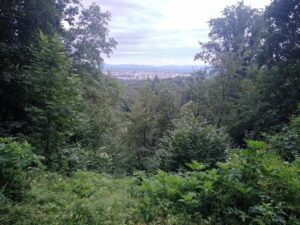
© Simon Stark
The most essential part next to work was of course to get to know Linz in special and Austria in general. As the cultural and linguistic ties between Austria and my home country Germany are relatively close, I halfway expected to avoid a culture shock once I adapted to the local dialect. But once the beer was sweet, the bread contained cumin and the sausages were actually better than in Germany, it definitely hit me. Next to the food side of things, the Austrian culture I’ve got to experience stood out by an avid “outdoors-culture” – which I thoroughly enjoyed – and the attitude to rather overspend on the good things on life than to end up with something bad – which I only got to enjoy once the Erasmus+ grant was approved.
Besides of things that appeared as distinctly Austrian to me, the city of Linz offers a pretty old town with a castle directly next to the Danube river and a rich cultural scene containing the Ars Electronica fair and two universities for arts. For parties on the other hand one didn’t even need to leave the university campus, as the students and faculties regularly organize faculty parties for their specific field of study or mensa-parties in the university canteen rooms for everyone. For me however, the most memorable activities were the hikes in the hills north of Linz, which is why I close this report with an image from there, with the city in the background.
My practical year in St. Johann in Tirol, Austria
- Medicine
- Austria, St. Johann in Tirol
- Bezirkskrankenhaus St. Johann in Tirol, department of “Allgemein- und Viszeralchirurgie”
- 11/2022 – 01/2023
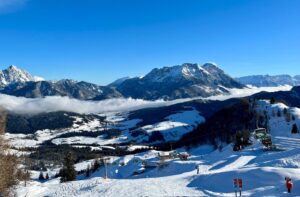
© Angela Kurz
Preparation
I applied around ten months before the start of the Practical Year (called Praktisches Jahr (PJ) in Germany or Klinisch Praktisches Jahr (KPJ) in Austria). However, most places at the hospital “Bezirkskrankenhaus St. Johann in Tirol” are already taken one and a half to two years in advance, so it makes sense to call first and ask if there are still places available. The contact person is the “Sekretariat Ärztliche Direktion”, whose contact details can be found on the hospital’s website. They will also tell you which documents you need for the application. The hospital is a teaching hospital of the Universities of Innsbruck and Vienna. I would recommend contacting Ms. Lemos, the coordinator for study abroad of the medical faculty of the RWTH Aachen University, in time for necessary formalities.
Accommodation
There is a house right next to the hospital where students who are interns at the hospital can stay for free. Each student has their own room and bathroom. The kitchen is shared and is a great meeting place for communal meals and game nights. You also get free breakfast, lunch, and dinner from the hospital. However, the number of rooms is limited, so you should register for this in time. Since there wasn’t a room available at first, I lived in an apartment in the neighbouring town for the first two weeks. Then I was able to move into the student house for the remaining time. I would recommend checking regularly with the secretary’s office, as there are often vacancies in the house at short notice. I found support in finding a private apartment at the secretary of the hospital and the tourism association (Tourismusverband St. Johann in Tirol), each of which sent me a list of contact details of private landlords via e-mail.
Traineeship
On the first day of my internship, I had some organisational tasks to do: I reported to the secretary’s office, received work clothes, a staff ID card, and keys. Then I introduced myself to the surgical department. The working day began daily at 7.15 a.m. with the morning meeting. Afterwards, we medical students took some blood samples on the ward or assisted in the operating theatre. The rest of the time we accompanied the doctors in the surgical outpatient department. The day ended around 4 pm after the X-ray discussion and the ward rounds – on Fridays, usually a little earlier. As a medical student at the hospital in St. Johann, you do two night shifts a month, one during the week from 4 pm until the next morning and one on the weekend. The tasks include taking blood samples, setting up intravenous lines and assisting in the operating theatre if necessary or helping in the emergency room. I would recommend rotating also to orthopaedics/trauma surgery as part of the surgical tertial if possible.
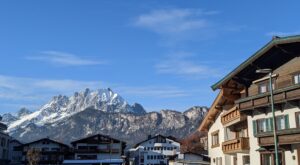
© Angela Kurz
Free time
The region around St. Johann in Tirol is situated in the middle of the mountains and offers many great leisure opportunities. There are many ski resorts nearby, e.g. St. Johann itself, Kitzbühel, Saalbach/Hinterglemm or Ellmau/Scheffau. In some of them you even get a discount with your employee ID card! In other seasons, of course, there are also wonderful hikes to be done. The cities of Kitzbühel, Innsbruck and Salzburg are also not far away. In December, the Kitzbühel Christmas Market is definitely worth a visit!
Conclusion
I really enjoyed my time in St. Johann in Tirol and can recommend a PJ tertial in this great area. I made many new friends, and we made great memories together in the hospital and during our weekends in the mountains.


